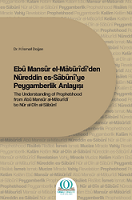Ebû Mansûr el-Mâtürîdî’den Nûreddin es-Sâbûnî’ye Peygamberlik Anlayışı
The Understanding of Prophethood from Abū Mansūr al-Māturīdī to Nūr al-Dīn al-Sābūnī
Author(s): Hacı İsmail Doğan
Subject(s): Theology and Religion, Islam studies, Sociology of Religion, Qur’anic studies
Published by: Oku Okut Yayınları
Keywords: Abū Mansūr al-Māturīdī; Nūr al-Dīn al-Sābūnī; Prophethood; Risālat; Ismat; Miracle; Revelation;
Summary/Abstract: The issue of prophethood is one of the fundamental principles of Islamic belief. Explaining the necessity of the institution of prophethood and responding to the criticisms directed at it are of great importance for establishing the doctrine of prophethood on a solid foundation. This study aims to conduct a comparative analysis of the views on prophethood of Abū Manṣūr alMāturīdī (d. 333/944), the founder of the Māturīdī school of theology, and one of the prominent theologians of this school, Nūr al-Dīn al-Sābūnī (d. 580/1184). al-Māturīdī, who lived in 4th/10th-century Samarkand, explained, defended, and systematized the tenets of faith accepted in the Ḥanafī tradition since Abū Ḥanīfa using the theological method. In this way, the theological approach within the Abū Ḥanīfa line evolved into a formal theological school through Māturīdī’s contributions. al-Sābūnī, who lived in 6th/12th-century Bukhara, contributed significantly to the dissemination and recognition of al-Māturīdī’s views through his written works. This research examines the approximately 250-year period from al-Māturīdī to al-Sābūnī with a particular focus on the issue of prophethood. The findings indicate that al-Māturīdī thoroughly addressed the topic of prophethood in his works, employing both rational and textual (naqlī) evidence to explain its necessity and developing original interpretations on the subject. al-Sābūnī, in general, adopted al-Māturīdī’s views on prophethood and defended them in his writings. However, al-Sābūnī diverged from al-Māturīdī in his understanding of infallibility (ʿisma), accepting that some prophets might have committed “mistakes” and disagreeing with the notion that prophets must be from urban backgrounds. Furthermore, he used different proofs for the validation of prophethood and included criticism of the Ḥashwiyya sect in his struggle against opponents of prophethood, which marks another distinction from Māturīdī’s approach.
- E-ISBN-13: 978-625-98869-8-5
- Page Count: 278
- Publication Year: 2024
- Language: Turkish
- eBook-PDF
- Table of Content
- Introduction

